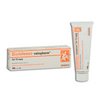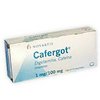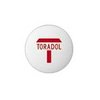 | Arcoxia (Etoricoxib) Active Ingredient: Etoricoxib Arcoxia is used to treat acute and chronic signs and symptoms of osteoarthritis and rheumatoid arthritis, acute gouty arthritis. It relieves acute pain and chronic musculoskeletal pain. It is also used in management of ankylosing spondylitis. |
INDICATIONS
Arcoxia is used for the following:
- acute and chronic treatment of the signs and symptoms of osteoarthritis and rheumatoid arthritis
- management of ankylosing spondylitis
- relief of chronic musculoskeletal pain
- relief of acute pain
- to treat acute gouty arthritis
INSTRUCTIONS
Take Arcoxia only when prescribed by your doctor.
When taking the tablets, swallow them with a glass of water. Do not halve the tablet.
Take your Arcoxia at about the same time each day.
Taking Arcoxia at the same time each day will have the best effect.
DOSAGE
For osteoarthritis, the recommended dose is 60 mg once a day.
For rheumatoid arthritis the recommended dose is 90 mg once a day.
For ankylosing spondylitis the recommended dose is 90 mg once a day.
For the relief of gout attacks the recommended dose is 120 mg once a day, which should only be used for the acute painful period.
For the relief of chronic musculoskeletal pain the recommended dose is 60 mg once a day.
The daily doses stated above for each condition should not be exceeded.
STORAGE
Keep Arcoxia in a cool dry place where the temperature stays below 30 degrees C (86 degrees F). Do not store it or any other medicine in the bathroom or near a sink. Do not leave it in the car or on window sills. Heat and dampness can destroy some medicines.
Keep it where children cannot reach it.
Do not take Arcoxia if:
- you have an allergy to Arcoxia or any of the ingredients listed at the end of this leaflet
- the packaging is torn or shows signs of tampering
- the expiry date on the pack has passed.
- If you take this medicine after the expiry date has passed, it may not work.
- You have had heart failure, a heart attack, bypass surgery, chest pain (angina), narrow or blocked arteries of the extremities (peripheral arterial disease), a stroke or mini stroke (TIA or transient ischaemic attack).
- You have high blood pressure that is not well controlled on blood pressure medication.
- You are having major surgery and have conditions which increase your risk of coronary artery disease or atherosclerosis such as high blood pressure, diabetes, high cholesterol or smoking.
- You are having major surgery on you heart or arteries.
Arcoxia should not be given to children.
Arcoxia tell your doctor if:
- you are pregnant or intend to become pregnant. Arcoxia is not recommended for use during late pregnancy. If there is a need to consider using Arcoxia during your pregnancy, your doctor will discuss with you the benefits and risks of using it.
- you are breast-feeding or plan to breast-feed. It is not known if Arcoxia passes into breast milk. You and your doctor should discuss whether you should stop breast-feeding or not take Arcoxia.
- you have or have had any medical conditions, especially the following: history of angina, heart attack or a blocked artery in your heart, narrow or blocked arteries of the extremities, kidney disease, liver disease, heart failure, high blood pressure.
- you have had an allergic reaction to aspirin or other anti-inflammatory medicines (commonly known as NSAIDs)
Symptoms of an allergic reaction may include asthma, pinkish itchy swellings on the skin (hives), runny or blocked nose. - you have an infection
If you take Arcoxia while you have an infection, it may hide fever and may make you think, mistakenly, that you are better or that your infection is less serious than it might be. - you have any allergies to any other medicines or any other substances, such as foods, preservatives or dyes.
- you have a history of stroke or mini stroke
- you have conditions which increase your risk of coronary artery disease or atherosclerosis such as high blood pressure, diabetes, high cholesterol or smoking.
Some medicines and Arcoxia may interfere with each other. These include:
- warfarin, a medicine used to prevent blood clots
- rifampicin, an antibiotic used to treat tuberculosis and other infections
- water pills (diuretics)
- ACE inhibitors and angiotensin receptor blockers, medicines used to lower high blood pressure or treat heart failure
- lithium, a medicine used to treat a certain type of depression
- birth control pills
- hormone replacement therapy
- methotrexate, a medicine used to suppress the immune system
Tell your doctor if you notice or have any of the following and they worry you:
- feeling sick (nausea), vomiting
- heartburn, indigestion, uncomfortable feeling or pain in the stomach
- diarrhoea
- swelling of the legs, ankles or feet
- high blood pressure
- dizziness
- headache
Additionally, the following have been reported:
- allergic reactions including rash, itching and hives
- severe skin reactions, which may occur without warning
- taste alteration
- wheezing
- insomnia
- anxiety
- drowsiness
- mouth ulcers
- diarrhoea
- severe increase in blood pressure
- confusion
- hallucinations
- platelets decreased
These are usually the mild adverse effects of Arcoxia.
If any of the following happen, stop taking Arcoxia and tell your doctor immediately or go to Accident and Emergency at your nearest hospital:
- swelling of the face, lips, tongue or throat which may cause difficulty in swallowing or breathing (hypersensitivity reactions, anaphylactic/anaphylactoid reactions including shock)
- abnormal rhythm of the heart (atrial fibrillation)
- heart failure
- palpitations
- serious kidney problems
- serious liver problems
- stomach pain
- stomach ulcers that may become serious and may bleed, and may occur at any time during use and without warning
 MestinonMestinon (Pyridostigmine) is used for treating myasthenia gravis.as low as $1.68
MestinonMestinon (Pyridostigmine) is used for treating myasthenia gravis.as low as $1.68 Diclofenac GelDiclofenac Gel is used for treating pain in certain joints (e.g., in the knees or hands) caused by osteoarthritis. It may also be used for other conditions as determined by your doctor. as low as $7.79
Diclofenac GelDiclofenac Gel is used for treating pain in certain joints (e.g., in the knees or hands) caused by osteoarthritis. It may also be used for other conditions as determined by your doctor. as low as $7.79 ImuranImuran belongs to the group of medicines known as immunosuppressive agents. It is used to reduce the body's natural immunity in patients who receive organ transplants. It is also used to treat rheumatoid arthritis. as low as $0.93
ImuranImuran belongs to the group of medicines known as immunosuppressive agents. It is used to reduce the body's natural immunity in patients who receive organ transplants. It is also used to treat rheumatoid arthritis. as low as $0.93 CafergotCafergot is used for preventing and treating certain kinds of headaches (eg, migraines, migraine variants, "histaminic cephalalgia").as low as $0.72
CafergotCafergot is used for preventing and treating certain kinds of headaches (eg, migraines, migraine variants, "histaminic cephalalgia").as low as $0.72 AzulfidineAzulfidine is used for treating ulcerative colitis. It is also used to increase the time between attacks of ulcerative colitis.as low as $0.82
AzulfidineAzulfidine is used for treating ulcerative colitis. It is also used to increase the time between attacks of ulcerative colitis.as low as $0.82 ToradolToradol is used short-term (5 days or less) to treat moderate to severe pain, usually after surgery. as low as $0.45
ToradolToradol is used short-term (5 days or less) to treat moderate to severe pain, usually after surgery. as low as $0.45